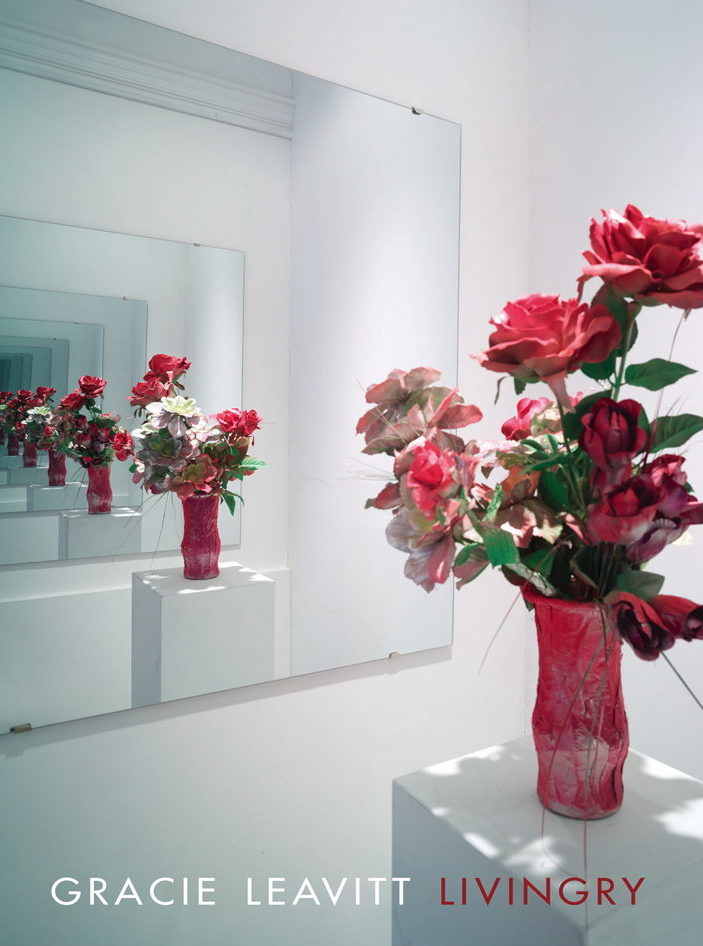Livingry
Gracie Leavitt
Nightboat, November 2018
Paperback, 96 pages
I understand the need to define / as a need for stability. That I and you can be things, standing understood, among each other
—Layli Long Soldier, “example:”
//
“In the gut where hunches come from / A message goes out loud as it can”: I study Ani Difranco’s playing hands, while imagining Gracie Leavitt’s voice pulsing as shards of light off the page. I re-encountered these lyrics from Ani Difranco’s “J” in the notes on the final page of Gracie Leavitt’s second collection Livingry. I hear a radical alliance in the gut of the message of female sound-lineage. When rage becomes articulated, performed, or rendered visible to the outside, it can remain a toxin or transfigure towards something generative. As I write this, my screen has several etymologies piled up in the background; my hands are cold as they type; beside me there is an empty mug of tea, an antique green and bronze reading lamp, dried fern leaves, a window out of which I see a wooden table, and the ghost of trees enveloped in a mist.
//
Leavitt writes, let’s insist its not / disordered to care / about what we care / about, the lyric. What does it mean for the lyric to care? Who is it caring for? Who are we caring for when we lyric? To encounter Leavitt’s lyric is to be offered language as though excavated from another world; the ancient jars of everyday meanings become shattered. One begins to enter a world of lush and unfamiliar syntax wherein meanings perform a dormant shape:
Dormant: (of an animal)
(of a plant or bud)
(of a volcano)
(of a disease)
//
In the opening poem of the collection, “LA ROMPUE,” Leavitt writes, feelings / pulled in by their yarn / escort: the fiction / of this poetry is that / it all gets written down / by one person, ha, if I am. Our escort becomes a hex to cure our singular understanding. Fiction and poetry are not binaries. The lyric does not arise from a notion of individuality. Meaning: a care must be collective to become ritualized.
– let it / become sentences, like silt / silk, more rhythm than / answer
Leavitt’s sentences enact a vocal wind, without attempt to locate a conclusion within its rhythms. Leavitt’s sentences are a fluid energy that vibrates as pieces of silk harbored through the texture of the earth: physicality of the dash: broken semantic being of the fragment: erratic patterns of a garden.
//
I make some word-diagrams in my notebook:
(preservation) —–
(lying making memoir)
—- (song) – (allium)
(mirrors) – – – (embolus)
spume
//
I read that Leavitt grew up in a cabin in New England: the region where Emily Dickinson wrote — covering envelopes and windows in the blood and pulse of her rhythm. There is a lush labyrinth of fragmented translations of female interiority. In “LOOSELEAF,” Leavitt writes, bent / on seeking sanctuary / from our security / state. Rooms of silence and rage become both sanctuaries and outlets. It is as though Leavitt’s rhythm has absorbed the growing resistance of centuries. The lyric does not remain interior. It offers that there / might be some /clarity / in address. For whom does the lyric sing? For whom does the lyric break?
SUCK RHYTHM
In my mind I loop the titles as mantras: STATICE STATUS STATICE STATUS STATICE STATUS : like a bruise / making a / place for itself.
//
What is your experience of enjambment? To seek, escape, relinquish, banish, recall, unwind, rewind, wind. I pick up a notebook and make asemic gestures. Marks of stress, tension, being.
 Days before this, I collected steeplebush from the field near Edna St. Vincent Millay’s home. I harbored these dried bush flowers in a plastic bag and carry them to my room. Millay was drawn to steeplebush, the pigment of which I want to pour on the asemic words and feel a lineage.
Days before this, I collected steeplebush from the field near Edna St. Vincent Millay’s home. I harbored these dried bush flowers in a plastic bag and carry them to my room. Millay was drawn to steeplebush, the pigment of which I want to pour on the asemic words and feel a lineage.
The physic garden / responds in / autobiography –
Here, I imagine Leavitt has read about Millay’s garden, has seen the image I have open on my screen now. Two limbs splayed onto the surface of the pool. To un-know is to surrender the desire to answer. Leavitt seems to answer back: Is it / a stressful lesson? I think I’m afraid of pulling a narrative out of that which actively resists the constraint of such: for hell / is certainty; certainty, / hell.
//
To write “garden,” to write “stitch” as rituals of resistance is more than re-claiming but an erasure of the violent idea that these were never powerful acts of making. In Garments Against Women, the voice in Anne Boyer’s poems takes up the practice of sewing. She procures fragments of cloth instead of shirts; she sews her own shirts; she measures how much she is disconnecting from the layered and violent labors.
“A work song is a piece of music closely connected to a form of work, either sung while conducting a task or a song linked to a task which might be a connected narrative, description, or protest song”; Your talent for / tight meter / like “freedom / of speech” / can be a trap / stretched wide / as the state / has reach.
I am compelled to imagine the composer of the poem is singing to herself. Leavitt’s “tight meter” is a restraint that becomes resistance to the trappings of the world–– a constraint birthed from a rhythm: a work song, written to the labor of sewing her own traps of out of dormant meanings:
Embolus: “a blood clot, air bubble, piece of fatty deposit, or other object that has been carried in the bloodstream to lodge in a vessel and cause an embolism.” I imagine Leavitt’s words as objects carried in the bloodstream. Are you afraid of how they are risking their care? On page seventy-eight, she writes, Stars / are crucial / shrapnel, cutting / clear through / the wallow / to invite you / into your own / fluency.
I utter aloud into the empty room wherein I write this: “are you compelled to denote or detonate?”
//
Leavitt shows us that shrapnel is crucial. The broken invigorating. To collect is not to put back together. To be eternally dormant, emerging, coming out, coming into, a volcano of influence, an endless network of feeling roots. To write a deeply female lyric is not a disorder or a cry for help. To plant, to sew, to take up, to bring care, to call for care is not a biography or an invitation to the room.
the heart of the voice does past.
I will keep Leavitt’s mantras sewn into my blood/stream heart/room.
 Savannah Hampton is a poet from Nevada who currently resides in Brooklyn, NY. Her/their work attempts to question the relation between text and silence, image and void, relation and isolation: currently residing in No, Dear, Bone Bouquet, Fanzine, and Gigantic Sequins.
Savannah Hampton is a poet from Nevada who currently resides in Brooklyn, NY. Her/their work attempts to question the relation between text and silence, image and void, relation and isolation: currently residing in No, Dear, Bone Bouquet, Fanzine, and Gigantic Sequins. 